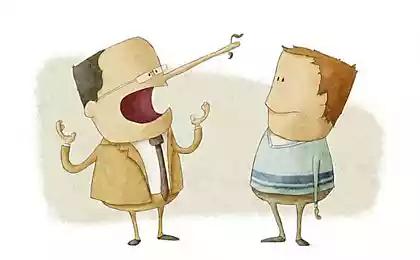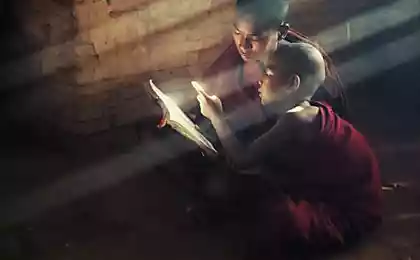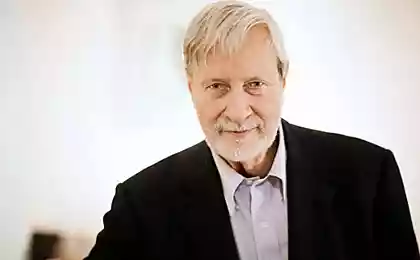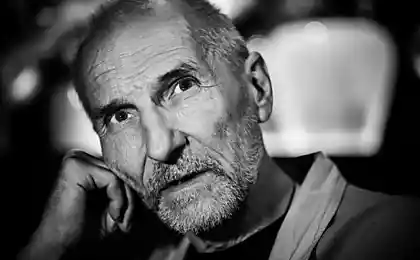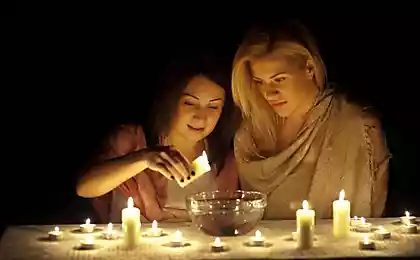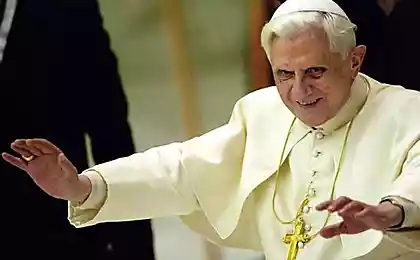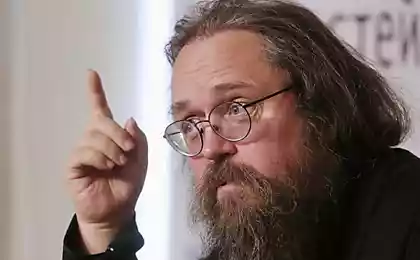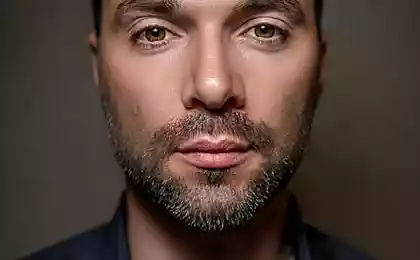743
"Everything that was said about Christianity, neopagans, is a lie,"
The priest Georgy Maksimov meets with people who come to Orthodoxy from various non-Orthodox denominations and misconceptions. Today we talked to father George Ivan Liskov, in adolescence were among the Satanists, then search "native faith" led him to the neopagans, with whom he was associated for many years.
The priest Georgy Maksimov: Today our guest is a man who had a lot to go through in this life and in Satanism, and through paganism. Ivan, please tell us about the beginning of your journey.
Ivan Liskov: Thank you, father George. I think you should start from childhood, because of my background history is still there. I remember I was seven or eight, when my mother went to the cemetery with grandma. Went on the train, and in the way I wanted to do something, not just to look out the window. I'm at my mother kept asking me to buy some newspaper to read. And this is the beginning of the 1990s, and Newspapers were the most diverse. My attention was drawn to "scary newspaper". It was a collection of some occult, magical tales, all sorts of "scary stories". Naturally, I was very curious when you consider that there is still and images were appropriate. I regularly read this newspaper and so gradually began to enter the world of the occult.
George: so, liked it?
Ivan Liskov: Not something that is liked is at first just fascinated. Some in this was a mystery, a mystique, and it is very attracted. I started to get used to the fact that it gradually comes into my life – stories about witches, magic, demons. It has become the norm, I no longer fear it. And since this was drawn, I began to be interested more and more. Then it was enough just to look away from the newspaper and see her lying next to the other "secret power". Everything was more "professional." Published an interview with magicians, sorcerers, psychics, healers, and contactees. Well and, accordingly, my horizons began to expand little by little. I started to get into specific areas of magic. Became interested in how it yourself to try how to start. And already c twelve years I was interested to read the various pamphlets of the type of "Practical magic" of Papus and other similar. Under their influence I came to understand that people can let into your life some forces that might be something to help. Something tangible, from wealth, from harming enemies. And I started to do this myself, and say that it really works.
Then I went even further. I wondered where it all stemmed: who gives this power? And so naturally came to the spirit world. And for me it was not evil spirits, not good spirits – I thought it is just such beings who can give you what you need. And I started to learn it all, and came across the book of the Kabbalah, which describes the names of the various spirits, described some of the rituals, how to call them. It was a Jewish name: Anael, Samael and others. And then, curious that why they are Jewish, I started looking for more information and learned from books that in the spirit world there is a strict hierarchy. And chief among them is Satan.
And all the previous occult literature I was prepared to accept Satan just as the head of this hierarchy. In any case, not as bad, and the ugly. Just like a misunderstood, tragic character, who at the same time can give a person unlimited power. "But if so, then perhaps it best," I reasoned. So I met Satanists – people who consciously devote their lives to the service directly to the devil. Surprisingly, in my own district was not one such person. I made friends with one of them. He was older than me and took a patronage over me. I asked him questions that interested me. And gradually asserted in it. He told me some give advice, answered questions. I came to the conclusion that there is a certain Church of Satan, there is a special music black metal called "black metal," which openly glorified the Prince of darkness, where man is introduced to the world of spirits and magic, where all the legends come to life, tales. And it seemed some mysterious island where you can escape from everyday reality, to hide and to feel there is a full-fledged resident of this fabulous country. And, in General, quite a powerful person.
George: And yet, as I was under the impression, Satanists, whatever they thought it might be Satan, there is some obsession with evil. And not only on themes of blasphemy and sacrilege, and murder, of suicide, for example. It does not bother you?
Ivan Liskov: it Certainly is. But Satanists are also different. There's a kind of vulgar occultists, a pop Satanism – those who hurt cats, paints her face and in every way outwardly expresses it visually. And there are people who, in General, is not exchanged, but who practice a variety of rituals and look more serious. They may not outwardly show their affiliation to Satanism. And evil for them is the category is not absolute. Evil is, as we understand it. For them it is not evil, it is just a necessity, for example. In particular, in the "satanic Bible" of Anton Shandor LaVey – the famous founder of the Church of Satan – it is written that the devil encourages the violation of all ten zapovedannost due to the fact that it is natural. That is, advances the idea that evil is not an absolute concept. For someone is evil, and for some it's good. In particular, the commandment "thou shalt not commit adultery" is perceived simply as a manifestation of some natural man began the ban as a restriction of liberty. The excuse is everything that you wish, including evil.
Father George: how do you from Satanism turned to neo-paganism?
Ivan Liskov: the same man who led me to Satanism, we subsequently came to the conclusion that Satanism is just such opposition to God, some vnutriukrainskie disassembly. That is, the Jewish God Jehovah, and there is a devil who opposes Him, but we're not Jews, not Jews. Why do we, the Jewish egregore, these Hebrew words, the system? We are Slavs, and so we have our own Slavic gods – Perun, Svarog, Dazhbog, etc. And so I moved from Satanism to paganism. Then, of course, I understand that the difference is small. But then for me it was a revelation because it seemed to me that I'm not from the negation of good, just from the opposition to Christianity came to a world that somehow relates to reality. It was a bridge between the world of dreams about the witches from the medieval tales and the world of our Russian villages. That is, I thought why go far, that's great-grandparents that are quite a were pagans. Or rather, great-great-great-grandfather's any there... a Thousand years ago lived.
Father George: forty generations ago.
Ivan Liskov: Yes. And, accordingly, it was highly encouraging. The idea of "we are Russian – we are Russian gods". I became interested in Ethnography, history of the Slavs. Look, it was quite difficult because at the age of 15 to read serious works of historians and ethnographers were not interested. And difficult, to be honest. Therefore, my attention was captured the popular books of the neo-pagan organizations, which then began to spread like mushrooms after rain. I began to read these works. There they have the main Magus, the founder of this movement, the man called the "Patriarch of Russian rodnoverie", – Ilya Cherkasov, known in neo-pagan circles as "the Magus Veleslav". This is a man who was fond of all sorts of mysticism. The Internet is full of photos where he is sitting with all sorts of Hindu tilakam on the forehead and tridents. Professes all sorts of tantric cults of the left hand. People are interesting. Indeed, the philosopher, not without it. And the leader of the "Community of rodoliubie". I bought his book "circle of praise" and gradually began to enter the practical world of neo-paganism, began to participate in the annual holidays – autumn and spring equinoxes, the winter and summer solstice. And I started to penetrate into a kind of poetics of paganism. The fact that paganism is closely associated with nature. And in this kind of a attractiveness. Because nature is always beautiful, it's something natural, to which man is committed.
Father George: me And my other friends who spoke to rodnoverie, can't shake the feeling that in fact many of them do not believe in these gods, which says where to paint and which to cut all those vertical lumps. (Laughs.) You have been so?
Ivan Liskov: Yes. Moreover, I asked this question to Ilya Cherkasov – "the magician Veleslava". And said to him: "I read your opus on LiveJournal. They even paganism have little relevance". Many pagans are now moving away from Veleslava, because it went into something tantric that Slavic paganism already has little to do. I tell him, "Look, you yourself write that the gods – these are some of the elements of consciousness... You don't believe in spirits, gods that are actually present here and now, which represent forces of nature and so on... You don't believe in what our forefathers believed". He says: "I do not know what I exactly believe. In the sense that I don't care who these gods. What matters is how we treat them, what we consider them. And whether they are or not is not important." So the person who entered into the world of modern neo-paganism, can be considered gods basically anything. And powers of this world, and your own mental strength. In General, the understanding of paganism among neo-pagans is so diverse that I then, at the end of this road, came to this conclusion: how many pagans as paganism. That is, each has it own.
Father George: And even in such matters which would treat the most important, if we were talking about real, serious religion. Namely: in what or in whom we believe? who we want – if you want to connect to? I saw some rodnovers have complained that they have on the issue of consent. Someone believes in the one God, and Slavic gods is just its symptoms; someone thinks that it is a separate the gods really exist. Someone thinks that this is some kind of manifestation of consciousness or just a personification of the elements. Yes, you first agree with each other, where do you people call it! But the situation is this: a man says: "Honour the native gods!" He said: "And who are they?" And he: "Yeah, whatever, let's go around the fire we'll dance!"
Ivan Liskov: And the most interesting, many of the Gentiles think that it is okay. They say we are free people, what you want and believe in it. Gods us nor forced to do anything, and no dogma is supposedly a plus. The situation is interesting, because neo-pagans blame Christians: here you have so many faiths, you two can't come to a common denominator. But if the main three directions of Christianity (Protestantism, Catholicism and Orthodoxy), that of paganism – hundreds, if not thousands. Even within the same community can be bipolar views about the same issue. I'm not talking about the fact that in paganism as such, in principle, neither the Theogony nor cosmology General. City each in his own way. So not for them to tell Christians about some of the differences. In paganism, ask: who is Perun? and you alone scientific versions, here are a few. Some will say that God squads, others will say that it is the God of storms, and so on. And modern neo-paganism is 85-90% of young people, age from 18 to 25 years who have little reading of scientific papers. Among them it is customary to think in slogans. And if someone shouted something... for Example, there is a neo-pagan ideologist Azar Raven (Leo R. Prozorov), he wrote in his book that during the baptism of Rus bloody Baptist massacred two thirds of the population.
George: they Usually say about three quarters. Like, 9 million of the 12 killed.
Ivan Liskov: Yes. And here the immature minds of the young man from such a slogan does not require any evidence. Tell him: "Cut out almost all" – and he believes. He will not ask: "what, really, was it?" He will climb somewhere to study this question. He will believe. And that's just one of those myths that exist in neopaganism.
George: let me tell you what struck me when I came into contact with the subject of neo-paganism. I do according to their education and the first specialty theologian, so I studied the different religions, and I'm hard to surprise. But the world of neo-paganism I was struck by how people are gullible to what they say. This is probably the most gullible people on earth. Because their authority can give completely unproven, fictional, made up data, and they immediately accept and begin to replicate... for Example, the ridiculous statement that supposedly the word "Christianity" actually comes from "rightly famous" and that it supposedly only in the XVI century, Christians in Russia have borrowed from the Gentiles, to call their faith by this word. But just go – I'm not even talking about the library – go to the Internet to Google translator, the word "ορθοδοξία" forget it and look how it translates. Look at the names of the Serbian and Bulgarian Churches. Why they are called Orthodox if it is here, in Russia, Patriarch Nikon stole the word allegedly to the Gentiles? People don't ask themselves such questions.
Ivan Liskov: on the Internet, if you look rodnovercheskaya sites, almost all of the content will consist of posters, carcinogen, pictures and the like. Rarely where can you find a serious article. I'm not saying that all neo-pagans are. I say that very few those who do something they are studying, you know. And the vast majority is content that these cartoons about paganism, some myths, tales and so on. Any ideology that rests on their pride and denies the Christianity will be absorbed by them. Because, in their opinion, Christianity is bad. And what then, if not Christianity? Gordienko-what is good will fall? The good lie pride the theory that we are Russian, and so that's our Aryan religion and so on... Everything else – it requires at least some thought. For example, to understand the Buddhism is not so simple. As in all religions with high theological thought.
Father Georgi: I think there is still such moment: if to become a member of some already well-known, actually existing and having its tradition of religion, then you'll be there apprentice, adept. You must humble ourselves under what is doctrine and practice of this religion. And neo-paganism attractive precisely because it is not preserved, no living tradition which was continuous from antiquity to the present time, – how preserved some of the aborigines of Africa or Australia, for example. We don't have that. No one knows what I believed our Slavic ancestors. So everyone is free to invent their own religion and become it is not a student and from a teacher, at least for himself.
Ivan Liskov: Plus we had the unwritten tradition. And so everybody can invent his own "Scripture". What, in General, and do many neo-pagans. I had most of the time of those ten years that I was neoyazychniki, to be in such organizations as the "ynglism." And there is the Scripture, which they give for what has come down from ancient times...
Father George: the Slavonic-Aryan Vedas?
Ivan Liskov: Yes. It is the collective name. There is particularly Santi and the Vedas of Perun, book of light, haratyi light. And here is the yngling appeal to what Scripture they have. More precisely, its translation into modern Russian. Question: where can the original text to meet? Founder ynglism Khinevich says he is somewhere in Siberia, hidden in a gold plate recorded. The question show – "in no case do not show, they will steal, they will withdraw". Even the picture is afraid to show, arguing that there are psychics that photo can be considered the whereabouts of the gold plates. And so on.
George: This is a very vivid example of the incredible gullibility of neo-pagans. Because, let's say, if I or any other person came to you and said, "you Know, I'll tell you all about your great-grandfather. You lied about it. You will know the truth. I got his diary, and now I know everything about him. There is described how you must live." Anyone would have said: "one diary to see?" And in response: "No, the diary you can not see. You, above all, listen to me. Here to buy, I have all sorts of appliances, tools – that they are just like your great-grandfather was. Here, even a little book about your grandfather, I have written it. And, most importantly, listen to me." No one wouldn't believe it. But when someone makes mention of our ancestors, who lived forty generations ago, the neo-pagans take it at face value and believe as children.
Ivan Liskov: Yes. And you rightly pointed out, even though they, the neo-pagans deny it, but they have a very developed guruism. They are very respectful of his guru. Of course, they call them differently is all sorts of magicians, sorcerers, vedamani, vedagiri all sorts of names they've invented. This authority to people they trust. Although in words they say "we have no authority, we have every man expresses how he feels the voice of the blood", and so on.
George: When you were in ynglings, which led you to the decision that there's still not what you're looking for?
Ivan Liskov: with regard to the ynglings – everything was quite simple. And solved immediately. I am a person who enjoys very seriously. And if I start wondering, I try to delve deeply into the subject. And when I was a yuengling, that went to Omsk, there lived in the same house with Khinevich, founder ynglism directly in the next room, he was in the room, came. The first thing that hooked me when I entered his room, I saw a huge number of books on suggestive psychology. That is Khinevich – the person whose room is full of bookcases. And a good half of them about a suggestion, talk, NLP and things like that. And, remembering the way he leads the conversation, like acting, he lectures, you can really understand that person well prepared. It plays a tone of voice, pauses and so on. In General, I got interested in this and started to dig, searching for some evidence. About the Golden plates I didn't ask, because it is, in General, impossible. Then I started looking for just some confirmation of some platitudes at least. In particular, "the Pater Dios," as he calls himself Khinevich, says that during the Russian Empire the knowledge of his doctrine was, in particular, the military, and showed the book Imperial military library in Kiev. I've got a scan of this book. And, in particular, he proves with this book that the Slavs there in the Pantheon of the Norse God Odin. A quote from this book is this – I quote from memory – that the "Mars has life, and God Alone gives this life". This cropped quote Khinevich shows. I this book held in hand and was reading it in his room. If you look at the context, that is written above and below these words, we see that it describes life on all planets. And, in particular, this quote suggests that God alone gives life – everything with a capital letter. That is "one" is not "God is One", and respect the statement that God is one. There is always referred to Christ. That is irrelevant to the build Khinevich has, if you look at the context. And, that's all. Pulling quotes out of context, distortion, pereviranie information and more.
Father George: And direct misinformation.
Ivan Liskov: Yes. And when you try to catch him in this – but not the one I was trying, – he, being the good psychologist, strongly leaves the answer as something jokes, and he has for many years avoided direct confrontations. So, when I started to dig it all... they Have the same "spiritual College" and "Seminary". I got the material from this "Seminary". And somehow, sorting them, I came across an interesting text files. It was straight from the computer Khinevich. And I found that if you compare the book of light – "the light hartu" – with what was in this file, you can see direct plagiarism. That is Khinevich takes the name of the file – not Slavic – and replaces it with the name of a Slavic God or creatures from their mythology. And the rest of the text is left almost unchanged. And then when I started looking I found out what that text was. This so-called "Moscow Legends of the knights Templar" Masonic text about how "satanail" staged a rebellion and so on. So he just "satanail" was renamed the "black God" and all that Masonic history is simply shifted in the Slavic way. Thus it is said, "the book of light." Else there the same, only the names have been changed. Having discovered this, I started to find like-minded people who from Khinevich years earlier was gone. Even from his direct associates, which are just like it went with lectures on ynglism, also had classes in "school", in "Seminary." They him left. Then I realized that this man is a liar. And shamelessly plays on the most sacred that a man can have – his religious feelings. And then, when I came across some information from the police about his activities, I realized that this brand deliberately, consciously.
On his land plot in Omsk pagan temple stood, which was burned. And there was an investigation. Many of the materials rose, they began to prosecute, repeatedly courts were. Materials really criminal: there are appeals to racial, religious and other hatred. It's a known fact.
George: It's a really famous story. But it is, shall we say, was a disappointment personally in person. And it turned into frustration in paganism in General?
Ivan Liskov: the First was a disappointment personally in person. And since he is the founder of this movement, then it in all his teaching went. I have absolutely no regrets. Then, after months and years, communicating with people, I more and more come to conclusions that escape from the ynglings – it was the right move. Now I just laugh about it, because more and more and more information.
George: And it was not from the other currents of neo-paganism to you any proposals or invitations?
Ivan Liskov: At that time I was a yuengling – was not. I was a zealous yuengling and defended their beliefs. I argued with rodnoverie, proving that they are just primitive, they do not realize that they have "all the information". And then, after retiring from the ynglings, of course, I was looking for. In 2003, it was held "chamber" of the pagans, which drew representatives from almost all communities. And, as usual, when they encounter each other, smiled, hugged and swore eternal love and friendship, and then behind each other accused of all possible sins. And so, after ynglism I went to Kiev. There is such neopagan organization "Generic ohnište". They also have the Scriptures, the so-called "boxes", "Vedaniya". I ask: "And you have it from?" They say: "the wise men have given us. Came the very Kiev the wise men who went into the forest from these that the Christian invaders, the aggressors." – "Wow! And what, personally came?" Answers: "I don't know if this vision was in a dream, and maybe, actually". I said, "I Understand." I also began to check, to look. And it turned out that these people just build a religious tokenism. Had with this organization also to break. Then with some organized circles to communicate tired, because they are all, by and large, the same. In the center of the person-the founder, who decided to be a visionary, rallied around the people. He is asked: "Where did you get taught? Where did you get that gods – it is as you say, and not, as others say?" And in response to the start of the "old songs about the main thing". That "I think so, I think so". – "Well, he thinks so..." – "yeah, he thinks so." I say, "And who is right then?" – "Everyone is right in their own way. See, here's the thing... There is such a region that..." And I just got tired of it. And then I thought: is it possible to just be a pagan without these organizations? I sincerely tried to create some organization – not in the religious sense, and in law – which would not have been involved in these community Affairs, the division and other things. Just a "Veche free the Slavs". That's just the Gentiles, without communities. People around me started to come together. And we arranged a meeting, even in Nizhny Novgorod went. And the people have arrived to Rostov with Peter. But then I realized that everything turns into the same thing... And sooner or later I'll become here in the same self-styled sorcerer-founder...
Father George: the neo-pagans this is a very important point of rhetoric, saying that "we teach what our ancestors believed, who lived thousands of years ago." That is, it appears, forty generations of our ancestors, who were Christians, we must become fools to declare that they were not there, that they were all traitors, they were wrong... Forty generations, including those closest to us. But the faith of those who lived over a thousand years ago, we were supposedly taught by neo-pagans. So this is the main deception. Because in reality information about the beliefs of ancient Slavs was not preserved, except in scattered passages. Therefore, without exception, neo-pagan groups and their faith is a remake. This is something that was invented by people now, our contemporaries.
Ivan Liskov: Of Course. That is why they have "Magi" in quotes, and "paganism" in quotes, and so on. Neo-paganism is a term not familiar to all. But it's accurate, because it immediately makes clear that what is now called rodnoverie and paganism, to the historical Slavic paganism has nothing. It is a religious remake. How many "Magi", so many teachings, so many nevezett. And so to read or to identify here is that modern neo-paganism, rodnoverie with the historical paganism of the Slavs is wrong. Any scientist will understand that neo-paganism is not paganism.
George: it's No secret that the neo-pagans, to put it mildly, a strong prejudice against Christianity. I would venture to guess that you have over the years that you spent there, it was developed. How, then, from the frustration of the neo-paganism you were still able to come to become a Christian?
Ivan Liskov: I'll Tell you what was my first most vivid religious experience in my life... I remember I was about five, I'm standing in the Church is a service, the smell of wax candles... I didn't know any theology. I just felt good, warm. I felt at home. And it is this feeling that I am loved and I am home – it helped me go back to Church. Because various religious teachings that I've tried on my own skin, give a kaleidoscope of various conditions, including positive, but this is some cool positive. Some cold fire. The exaltation, the ecstasy of some kind. But there is such a warm, native something. It's like a mother and stepmother. The stepmother may also be taken care of, but a mother's love you she will not feel. And here. Not as many rational arguments as that's a personal feeling helped me. As for rational, indeed, myths about Christianity to neo-paganism more than anywhere else. It referred to the Baptism of Russia, the bloody, and much more. And, behold, the word of a theologian, all these myths can be, as the logs off the road, pull apart, and thus open the way to the temple. Because there would be so many Orthodox people, if even some of these myths were true. Those myths are absolutely false, neopagans consciously distribute them in terms of propaganda. Young immature teenage mind, which is mainly directed neo-pagan propaganda, ready to soak up these cliches, these myths. And to understand them it doesn't.
George: so what made you think again about Christianity?
Ivan Liskov: I'll Start with the fact that Christianity is not a pagan one never forgets. The hatred of Christianity permeated the whole neo-paganism, and so it is always neoyazychniki in memory. That, in fact, prompts are always interested to look and read to find what would have to expose Christianity and to identify any inconsistencies and contradictions.
And when I started to move away from neo-paganism, I began to wonder what to replace it. For neo-pagans are important concepts such as "ancestors", "tradition", "national culture," and, accordingly, the question arises: which religion is able to give connection with them, except for paganism? Such a religion one is pravoslavnata. Many generations of our ancestors have died with Christ's name on his lips under the banner of a Saviour. Realizing this, I began to search in that direction. The lecture of the Orthodox apologists helped to destroy many of the myths about Christianity. And then I began himself to study the subject: the Orthodox theology, Church history, etc. and came to Christianity when I realized that all what he said about Christianity, neopagans, – lies. For it turns out that Christianity is simply misrepresented. After 70 years of anti-Christian propaganda is the most slandered religion. If you throw aside the lies and myths about Orthodoxy, for the Russian person of a different faith, traditions, culture and is not necessary. As there was no need of many, many generations of our glorious and heroic ancestors.
George: did you Feel something special when I went to the temple?
Ivan Liskov: to go to Church, I never ceased even as a Gentile. Was always interest, and to some extent even pulled. But basically came to find a reason to criticize: how are these "hrusov" and priests are all bad. But, as I mentioned, the very first memories from my childhood associated with the temple, was very warm and bright. And for many years of neo-paganism the memory of it did not disappear, and I remembered how warm, light and cozy it was in the temple. And whenever you come into the temple, even with the hatred in your heart, I still felt that the temple is SOMETHING there. And it's SOMETHING not hostile and evil, but rather the opposite. Of course, no Gentile would never admit it, because he's always looking for a reason to doubt, but God never to Himself by force does not drag. If the person does not want to see in the temple of God, force God to compel will not. God does not impose His companies. But what is interesting: in the Orthodox Church even the fierce pagan had never felt emptiness. Maybe something foreign, maybe something is not appropriate his ideas. But there is SOMETHING there for sure is I was told by my then fellow neo-pagans. It is now clear that in the temple of God.
George: some of the secular people may ask the question: "And what for was to change from one faith to another? they say, and you generally do or what not to believe." Tell me what you got and felt in the Church which was not in paganism and what not would give atheism or agnosticism.
Ivan Liskov: Any neo-pagans projecting some features of Orthodoxy in neo-paganism, albeit subconsciously. After all, feeling the closeness of the ancestors, love of nature and something native is the key that bind man to paganism. The feeling of the native land and the like. Many people think that in Christianity it is not. It is the feeling that everything fell into place and naturally decomposed on the shelves – that's the feeling I had when I returned to the Church. It was after the return much was clear to me. It became clear why our ancestors do not die and why are we with them never forever don't say goodbye – our communion through the Church, through prayer persists. It became clear, how can you justify the love for mother nature and their Homeland, history and life which is woven from Orthodoxy. But the most important is a sense of Grace in the Church, in the Church, the Liturgy and just in the Holy places. And this is no ordinary reverence for nature in paganism – after all, nature can be admired in Christianity. In addition, it was something more, there was a sense of peace in my soul – a feeling of Grace and Love of God. This paganism is not in him think in different categories and do not rise above the delight in front of nature and feelings of kinship with gods and ancestors. In Christianity it is possible to feel a much deeper, clearer and more. Most importantly: "God is Love". In paganism it is not. That is what you feel in Christianity. Feel The Love. Feel that love you and your natural need to love is in demand.
And, unlike the fictional gods of paganism, by which you can understand what I want, but which you, by and large, do not really need, in a relationship with a real God you feel the response on His part, He helps you. Amusedby Providence. Just recently, it was very explicitly for me and my family, a Miracle happened now, and no one doubts that. I won't go into details because it's personal. But the signs were there – and, God forbid, will be.
George: And what was it like to go to first confession after three years of Satanism and ten years of paganism? Isn't it hard?
Ivan Liskov: the First confession after his return to the Church was very heavy. It really was a shock. Confession in a literal translation from the Greek – a change of mind. Very much she changed my life, very much thanks to her, I reconsidered. I especially want to remember and thank the father, I confessed, father Joasaph. He very warmly and lovingly accepted me and treated paternally, with understanding. He did not ask more than necessary, was not overly strict – that is, adopted, as befits a priest, – as the father of the prodigal son. With love.
Confession is a very complex process, very deep layers of the soul addressed. First confession is a significant event through which should pass. It's like milestones – the first column on the long road, without which no peace with God. And irrespective of neo-paganism and other deviations from the Truth – anyone without confession dries up. So it's an important event – the return to the Church, the first confession – it's been for me very at home. I was welcomed home. And this memory is very precious to me.
Father George: And how did the Gentile friends when they found out that you became a Christian?
Ivan Liskov: Treated differently. For the most part, I became a traitor. Someone thought I was working for the secret services and trying to destroy the neo-pagan movement. Some believe that it is sincere, and treated with understanding. A small part – and this is my closest friends after a few years I returned to the Church. We talked a lot, we had hot debates, and do not know whether in my example or in other ways, but the most important people of the pagan past became Christians.
Everyone has their own way, and the choice everyone makes for himself. I wish the remaining paganism of my friends just deep and impartial study of the question – and that would be enough to at least to understand the mind of the failure of neo-paganism, and possibly return to the Church. In paganism, people hold only a distorted view of Christianity. Well and banal pride: not so many years to spend it all at once up, the inertia is large. But there is a God, and He really is Love. I wish all neo-pagans to learn it.published
Ivan Laskovym interviewed by priest Georgy Maximov
P. S. And remember, just changing your mind - together we change the world! ©
Source: www.pravoslavie.ru/put/79270.htm
The priest Georgy Maksimov: Today our guest is a man who had a lot to go through in this life and in Satanism, and through paganism. Ivan, please tell us about the beginning of your journey.
Ivan Liskov: Thank you, father George. I think you should start from childhood, because of my background history is still there. I remember I was seven or eight, when my mother went to the cemetery with grandma. Went on the train, and in the way I wanted to do something, not just to look out the window. I'm at my mother kept asking me to buy some newspaper to read. And this is the beginning of the 1990s, and Newspapers were the most diverse. My attention was drawn to "scary newspaper". It was a collection of some occult, magical tales, all sorts of "scary stories". Naturally, I was very curious when you consider that there is still and images were appropriate. I regularly read this newspaper and so gradually began to enter the world of the occult.
George: so, liked it?
Ivan Liskov: Not something that is liked is at first just fascinated. Some in this was a mystery, a mystique, and it is very attracted. I started to get used to the fact that it gradually comes into my life – stories about witches, magic, demons. It has become the norm, I no longer fear it. And since this was drawn, I began to be interested more and more. Then it was enough just to look away from the newspaper and see her lying next to the other "secret power". Everything was more "professional." Published an interview with magicians, sorcerers, psychics, healers, and contactees. Well and, accordingly, my horizons began to expand little by little. I started to get into specific areas of magic. Became interested in how it yourself to try how to start. And already c twelve years I was interested to read the various pamphlets of the type of "Practical magic" of Papus and other similar. Under their influence I came to understand that people can let into your life some forces that might be something to help. Something tangible, from wealth, from harming enemies. And I started to do this myself, and say that it really works.
Then I went even further. I wondered where it all stemmed: who gives this power? And so naturally came to the spirit world. And for me it was not evil spirits, not good spirits – I thought it is just such beings who can give you what you need. And I started to learn it all, and came across the book of the Kabbalah, which describes the names of the various spirits, described some of the rituals, how to call them. It was a Jewish name: Anael, Samael and others. And then, curious that why they are Jewish, I started looking for more information and learned from books that in the spirit world there is a strict hierarchy. And chief among them is Satan.
And all the previous occult literature I was prepared to accept Satan just as the head of this hierarchy. In any case, not as bad, and the ugly. Just like a misunderstood, tragic character, who at the same time can give a person unlimited power. "But if so, then perhaps it best," I reasoned. So I met Satanists – people who consciously devote their lives to the service directly to the devil. Surprisingly, in my own district was not one such person. I made friends with one of them. He was older than me and took a patronage over me. I asked him questions that interested me. And gradually asserted in it. He told me some give advice, answered questions. I came to the conclusion that there is a certain Church of Satan, there is a special music black metal called "black metal," which openly glorified the Prince of darkness, where man is introduced to the world of spirits and magic, where all the legends come to life, tales. And it seemed some mysterious island where you can escape from everyday reality, to hide and to feel there is a full-fledged resident of this fabulous country. And, in General, quite a powerful person.
George: And yet, as I was under the impression, Satanists, whatever they thought it might be Satan, there is some obsession with evil. And not only on themes of blasphemy and sacrilege, and murder, of suicide, for example. It does not bother you?
Ivan Liskov: it Certainly is. But Satanists are also different. There's a kind of vulgar occultists, a pop Satanism – those who hurt cats, paints her face and in every way outwardly expresses it visually. And there are people who, in General, is not exchanged, but who practice a variety of rituals and look more serious. They may not outwardly show their affiliation to Satanism. And evil for them is the category is not absolute. Evil is, as we understand it. For them it is not evil, it is just a necessity, for example. In particular, in the "satanic Bible" of Anton Shandor LaVey – the famous founder of the Church of Satan – it is written that the devil encourages the violation of all ten zapovedannost due to the fact that it is natural. That is, advances the idea that evil is not an absolute concept. For someone is evil, and for some it's good. In particular, the commandment "thou shalt not commit adultery" is perceived simply as a manifestation of some natural man began the ban as a restriction of liberty. The excuse is everything that you wish, including evil.
Father George: how do you from Satanism turned to neo-paganism?
Ivan Liskov: the same man who led me to Satanism, we subsequently came to the conclusion that Satanism is just such opposition to God, some vnutriukrainskie disassembly. That is, the Jewish God Jehovah, and there is a devil who opposes Him, but we're not Jews, not Jews. Why do we, the Jewish egregore, these Hebrew words, the system? We are Slavs, and so we have our own Slavic gods – Perun, Svarog, Dazhbog, etc. And so I moved from Satanism to paganism. Then, of course, I understand that the difference is small. But then for me it was a revelation because it seemed to me that I'm not from the negation of good, just from the opposition to Christianity came to a world that somehow relates to reality. It was a bridge between the world of dreams about the witches from the medieval tales and the world of our Russian villages. That is, I thought why go far, that's great-grandparents that are quite a were pagans. Or rather, great-great-great-grandfather's any there... a Thousand years ago lived.
Father George: forty generations ago.
Ivan Liskov: Yes. And, accordingly, it was highly encouraging. The idea of "we are Russian – we are Russian gods". I became interested in Ethnography, history of the Slavs. Look, it was quite difficult because at the age of 15 to read serious works of historians and ethnographers were not interested. And difficult, to be honest. Therefore, my attention was captured the popular books of the neo-pagan organizations, which then began to spread like mushrooms after rain. I began to read these works. There they have the main Magus, the founder of this movement, the man called the "Patriarch of Russian rodnoverie", – Ilya Cherkasov, known in neo-pagan circles as "the Magus Veleslav". This is a man who was fond of all sorts of mysticism. The Internet is full of photos where he is sitting with all sorts of Hindu tilakam on the forehead and tridents. Professes all sorts of tantric cults of the left hand. People are interesting. Indeed, the philosopher, not without it. And the leader of the "Community of rodoliubie". I bought his book "circle of praise" and gradually began to enter the practical world of neo-paganism, began to participate in the annual holidays – autumn and spring equinoxes, the winter and summer solstice. And I started to penetrate into a kind of poetics of paganism. The fact that paganism is closely associated with nature. And in this kind of a attractiveness. Because nature is always beautiful, it's something natural, to which man is committed.
Father George: me And my other friends who spoke to rodnoverie, can't shake the feeling that in fact many of them do not believe in these gods, which says where to paint and which to cut all those vertical lumps. (Laughs.) You have been so?
Ivan Liskov: Yes. Moreover, I asked this question to Ilya Cherkasov – "the magician Veleslava". And said to him: "I read your opus on LiveJournal. They even paganism have little relevance". Many pagans are now moving away from Veleslava, because it went into something tantric that Slavic paganism already has little to do. I tell him, "Look, you yourself write that the gods – these are some of the elements of consciousness... You don't believe in spirits, gods that are actually present here and now, which represent forces of nature and so on... You don't believe in what our forefathers believed". He says: "I do not know what I exactly believe. In the sense that I don't care who these gods. What matters is how we treat them, what we consider them. And whether they are or not is not important." So the person who entered into the world of modern neo-paganism, can be considered gods basically anything. And powers of this world, and your own mental strength. In General, the understanding of paganism among neo-pagans is so diverse that I then, at the end of this road, came to this conclusion: how many pagans as paganism. That is, each has it own.
Father George: And even in such matters which would treat the most important, if we were talking about real, serious religion. Namely: in what or in whom we believe? who we want – if you want to connect to? I saw some rodnovers have complained that they have on the issue of consent. Someone believes in the one God, and Slavic gods is just its symptoms; someone thinks that it is a separate the gods really exist. Someone thinks that this is some kind of manifestation of consciousness or just a personification of the elements. Yes, you first agree with each other, where do you people call it! But the situation is this: a man says: "Honour the native gods!" He said: "And who are they?" And he: "Yeah, whatever, let's go around the fire we'll dance!"
Ivan Liskov: And the most interesting, many of the Gentiles think that it is okay. They say we are free people, what you want and believe in it. Gods us nor forced to do anything, and no dogma is supposedly a plus. The situation is interesting, because neo-pagans blame Christians: here you have so many faiths, you two can't come to a common denominator. But if the main three directions of Christianity (Protestantism, Catholicism and Orthodoxy), that of paganism – hundreds, if not thousands. Even within the same community can be bipolar views about the same issue. I'm not talking about the fact that in paganism as such, in principle, neither the Theogony nor cosmology General. City each in his own way. So not for them to tell Christians about some of the differences. In paganism, ask: who is Perun? and you alone scientific versions, here are a few. Some will say that God squads, others will say that it is the God of storms, and so on. And modern neo-paganism is 85-90% of young people, age from 18 to 25 years who have little reading of scientific papers. Among them it is customary to think in slogans. And if someone shouted something... for Example, there is a neo-pagan ideologist Azar Raven (Leo R. Prozorov), he wrote in his book that during the baptism of Rus bloody Baptist massacred two thirds of the population.
George: they Usually say about three quarters. Like, 9 million of the 12 killed.
Ivan Liskov: Yes. And here the immature minds of the young man from such a slogan does not require any evidence. Tell him: "Cut out almost all" – and he believes. He will not ask: "what, really, was it?" He will climb somewhere to study this question. He will believe. And that's just one of those myths that exist in neopaganism.
George: let me tell you what struck me when I came into contact with the subject of neo-paganism. I do according to their education and the first specialty theologian, so I studied the different religions, and I'm hard to surprise. But the world of neo-paganism I was struck by how people are gullible to what they say. This is probably the most gullible people on earth. Because their authority can give completely unproven, fictional, made up data, and they immediately accept and begin to replicate... for Example, the ridiculous statement that supposedly the word "Christianity" actually comes from "rightly famous" and that it supposedly only in the XVI century, Christians in Russia have borrowed from the Gentiles, to call their faith by this word. But just go – I'm not even talking about the library – go to the Internet to Google translator, the word "ορθοδοξία" forget it and look how it translates. Look at the names of the Serbian and Bulgarian Churches. Why they are called Orthodox if it is here, in Russia, Patriarch Nikon stole the word allegedly to the Gentiles? People don't ask themselves such questions.
Ivan Liskov: on the Internet, if you look rodnovercheskaya sites, almost all of the content will consist of posters, carcinogen, pictures and the like. Rarely where can you find a serious article. I'm not saying that all neo-pagans are. I say that very few those who do something they are studying, you know. And the vast majority is content that these cartoons about paganism, some myths, tales and so on. Any ideology that rests on their pride and denies the Christianity will be absorbed by them. Because, in their opinion, Christianity is bad. And what then, if not Christianity? Gordienko-what is good will fall? The good lie pride the theory that we are Russian, and so that's our Aryan religion and so on... Everything else – it requires at least some thought. For example, to understand the Buddhism is not so simple. As in all religions with high theological thought.
Father Georgi: I think there is still such moment: if to become a member of some already well-known, actually existing and having its tradition of religion, then you'll be there apprentice, adept. You must humble ourselves under what is doctrine and practice of this religion. And neo-paganism attractive precisely because it is not preserved, no living tradition which was continuous from antiquity to the present time, – how preserved some of the aborigines of Africa or Australia, for example. We don't have that. No one knows what I believed our Slavic ancestors. So everyone is free to invent their own religion and become it is not a student and from a teacher, at least for himself.
Ivan Liskov: Plus we had the unwritten tradition. And so everybody can invent his own "Scripture". What, in General, and do many neo-pagans. I had most of the time of those ten years that I was neoyazychniki, to be in such organizations as the "ynglism." And there is the Scripture, which they give for what has come down from ancient times...
Father George: the Slavonic-Aryan Vedas?
Ivan Liskov: Yes. It is the collective name. There is particularly Santi and the Vedas of Perun, book of light, haratyi light. And here is the yngling appeal to what Scripture they have. More precisely, its translation into modern Russian. Question: where can the original text to meet? Founder ynglism Khinevich says he is somewhere in Siberia, hidden in a gold plate recorded. The question show – "in no case do not show, they will steal, they will withdraw". Even the picture is afraid to show, arguing that there are psychics that photo can be considered the whereabouts of the gold plates. And so on.
George: This is a very vivid example of the incredible gullibility of neo-pagans. Because, let's say, if I or any other person came to you and said, "you Know, I'll tell you all about your great-grandfather. You lied about it. You will know the truth. I got his diary, and now I know everything about him. There is described how you must live." Anyone would have said: "one diary to see?" And in response: "No, the diary you can not see. You, above all, listen to me. Here to buy, I have all sorts of appliances, tools – that they are just like your great-grandfather was. Here, even a little book about your grandfather, I have written it. And, most importantly, listen to me." No one wouldn't believe it. But when someone makes mention of our ancestors, who lived forty generations ago, the neo-pagans take it at face value and believe as children.
Ivan Liskov: Yes. And you rightly pointed out, even though they, the neo-pagans deny it, but they have a very developed guruism. They are very respectful of his guru. Of course, they call them differently is all sorts of magicians, sorcerers, vedamani, vedagiri all sorts of names they've invented. This authority to people they trust. Although in words they say "we have no authority, we have every man expresses how he feels the voice of the blood", and so on.
George: When you were in ynglings, which led you to the decision that there's still not what you're looking for?
Ivan Liskov: with regard to the ynglings – everything was quite simple. And solved immediately. I am a person who enjoys very seriously. And if I start wondering, I try to delve deeply into the subject. And when I was a yuengling, that went to Omsk, there lived in the same house with Khinevich, founder ynglism directly in the next room, he was in the room, came. The first thing that hooked me when I entered his room, I saw a huge number of books on suggestive psychology. That is Khinevich – the person whose room is full of bookcases. And a good half of them about a suggestion, talk, NLP and things like that. And, remembering the way he leads the conversation, like acting, he lectures, you can really understand that person well prepared. It plays a tone of voice, pauses and so on. In General, I got interested in this and started to dig, searching for some evidence. About the Golden plates I didn't ask, because it is, in General, impossible. Then I started looking for just some confirmation of some platitudes at least. In particular, "the Pater Dios," as he calls himself Khinevich, says that during the Russian Empire the knowledge of his doctrine was, in particular, the military, and showed the book Imperial military library in Kiev. I've got a scan of this book. And, in particular, he proves with this book that the Slavs there in the Pantheon of the Norse God Odin. A quote from this book is this – I quote from memory – that the "Mars has life, and God Alone gives this life". This cropped quote Khinevich shows. I this book held in hand and was reading it in his room. If you look at the context, that is written above and below these words, we see that it describes life on all planets. And, in particular, this quote suggests that God alone gives life – everything with a capital letter. That is "one" is not "God is One", and respect the statement that God is one. There is always referred to Christ. That is irrelevant to the build Khinevich has, if you look at the context. And, that's all. Pulling quotes out of context, distortion, pereviranie information and more.
Father George: And direct misinformation.
Ivan Liskov: Yes. And when you try to catch him in this – but not the one I was trying, – he, being the good psychologist, strongly leaves the answer as something jokes, and he has for many years avoided direct confrontations. So, when I started to dig it all... they Have the same "spiritual College" and "Seminary". I got the material from this "Seminary". And somehow, sorting them, I came across an interesting text files. It was straight from the computer Khinevich. And I found that if you compare the book of light – "the light hartu" – with what was in this file, you can see direct plagiarism. That is Khinevich takes the name of the file – not Slavic – and replaces it with the name of a Slavic God or creatures from their mythology. And the rest of the text is left almost unchanged. And then when I started looking I found out what that text was. This so-called "Moscow Legends of the knights Templar" Masonic text about how "satanail" staged a rebellion and so on. So he just "satanail" was renamed the "black God" and all that Masonic history is simply shifted in the Slavic way. Thus it is said, "the book of light." Else there the same, only the names have been changed. Having discovered this, I started to find like-minded people who from Khinevich years earlier was gone. Even from his direct associates, which are just like it went with lectures on ynglism, also had classes in "school", in "Seminary." They him left. Then I realized that this man is a liar. And shamelessly plays on the most sacred that a man can have – his religious feelings. And then, when I came across some information from the police about his activities, I realized that this brand deliberately, consciously.
On his land plot in Omsk pagan temple stood, which was burned. And there was an investigation. Many of the materials rose, they began to prosecute, repeatedly courts were. Materials really criminal: there are appeals to racial, religious and other hatred. It's a known fact.
George: It's a really famous story. But it is, shall we say, was a disappointment personally in person. And it turned into frustration in paganism in General?
Ivan Liskov: the First was a disappointment personally in person. And since he is the founder of this movement, then it in all his teaching went. I have absolutely no regrets. Then, after months and years, communicating with people, I more and more come to conclusions that escape from the ynglings – it was the right move. Now I just laugh about it, because more and more and more information.
George: And it was not from the other currents of neo-paganism to you any proposals or invitations?
Ivan Liskov: At that time I was a yuengling – was not. I was a zealous yuengling and defended their beliefs. I argued with rodnoverie, proving that they are just primitive, they do not realize that they have "all the information". And then, after retiring from the ynglings, of course, I was looking for. In 2003, it was held "chamber" of the pagans, which drew representatives from almost all communities. And, as usual, when they encounter each other, smiled, hugged and swore eternal love and friendship, and then behind each other accused of all possible sins. And so, after ynglism I went to Kiev. There is such neopagan organization "Generic ohnište". They also have the Scriptures, the so-called "boxes", "Vedaniya". I ask: "And you have it from?" They say: "the wise men have given us. Came the very Kiev the wise men who went into the forest from these that the Christian invaders, the aggressors." – "Wow! And what, personally came?" Answers: "I don't know if this vision was in a dream, and maybe, actually". I said, "I Understand." I also began to check, to look. And it turned out that these people just build a religious tokenism. Had with this organization also to break. Then with some organized circles to communicate tired, because they are all, by and large, the same. In the center of the person-the founder, who decided to be a visionary, rallied around the people. He is asked: "Where did you get taught? Where did you get that gods – it is as you say, and not, as others say?" And in response to the start of the "old songs about the main thing". That "I think so, I think so". – "Well, he thinks so..." – "yeah, he thinks so." I say, "And who is right then?" – "Everyone is right in their own way. See, here's the thing... There is such a region that..." And I just got tired of it. And then I thought: is it possible to just be a pagan without these organizations? I sincerely tried to create some organization – not in the religious sense, and in law – which would not have been involved in these community Affairs, the division and other things. Just a "Veche free the Slavs". That's just the Gentiles, without communities. People around me started to come together. And we arranged a meeting, even in Nizhny Novgorod went. And the people have arrived to Rostov with Peter. But then I realized that everything turns into the same thing... And sooner or later I'll become here in the same self-styled sorcerer-founder...
Father George: the neo-pagans this is a very important point of rhetoric, saying that "we teach what our ancestors believed, who lived thousands of years ago." That is, it appears, forty generations of our ancestors, who were Christians, we must become fools to declare that they were not there, that they were all traitors, they were wrong... Forty generations, including those closest to us. But the faith of those who lived over a thousand years ago, we were supposedly taught by neo-pagans. So this is the main deception. Because in reality information about the beliefs of ancient Slavs was not preserved, except in scattered passages. Therefore, without exception, neo-pagan groups and their faith is a remake. This is something that was invented by people now, our contemporaries.
Ivan Liskov: Of Course. That is why they have "Magi" in quotes, and "paganism" in quotes, and so on. Neo-paganism is a term not familiar to all. But it's accurate, because it immediately makes clear that what is now called rodnoverie and paganism, to the historical Slavic paganism has nothing. It is a religious remake. How many "Magi", so many teachings, so many nevezett. And so to read or to identify here is that modern neo-paganism, rodnoverie with the historical paganism of the Slavs is wrong. Any scientist will understand that neo-paganism is not paganism.
George: it's No secret that the neo-pagans, to put it mildly, a strong prejudice against Christianity. I would venture to guess that you have over the years that you spent there, it was developed. How, then, from the frustration of the neo-paganism you were still able to come to become a Christian?
Ivan Liskov: I'll Tell you what was my first most vivid religious experience in my life... I remember I was about five, I'm standing in the Church is a service, the smell of wax candles... I didn't know any theology. I just felt good, warm. I felt at home. And it is this feeling that I am loved and I am home – it helped me go back to Church. Because various religious teachings that I've tried on my own skin, give a kaleidoscope of various conditions, including positive, but this is some cool positive. Some cold fire. The exaltation, the ecstasy of some kind. But there is such a warm, native something. It's like a mother and stepmother. The stepmother may also be taken care of, but a mother's love you she will not feel. And here. Not as many rational arguments as that's a personal feeling helped me. As for rational, indeed, myths about Christianity to neo-paganism more than anywhere else. It referred to the Baptism of Russia, the bloody, and much more. And, behold, the word of a theologian, all these myths can be, as the logs off the road, pull apart, and thus open the way to the temple. Because there would be so many Orthodox people, if even some of these myths were true. Those myths are absolutely false, neopagans consciously distribute them in terms of propaganda. Young immature teenage mind, which is mainly directed neo-pagan propaganda, ready to soak up these cliches, these myths. And to understand them it doesn't.
George: so what made you think again about Christianity?
Ivan Liskov: I'll Start with the fact that Christianity is not a pagan one never forgets. The hatred of Christianity permeated the whole neo-paganism, and so it is always neoyazychniki in memory. That, in fact, prompts are always interested to look and read to find what would have to expose Christianity and to identify any inconsistencies and contradictions.
And when I started to move away from neo-paganism, I began to wonder what to replace it. For neo-pagans are important concepts such as "ancestors", "tradition", "national culture," and, accordingly, the question arises: which religion is able to give connection with them, except for paganism? Such a religion one is pravoslavnata. Many generations of our ancestors have died with Christ's name on his lips under the banner of a Saviour. Realizing this, I began to search in that direction. The lecture of the Orthodox apologists helped to destroy many of the myths about Christianity. And then I began himself to study the subject: the Orthodox theology, Church history, etc. and came to Christianity when I realized that all what he said about Christianity, neopagans, – lies. For it turns out that Christianity is simply misrepresented. After 70 years of anti-Christian propaganda is the most slandered religion. If you throw aside the lies and myths about Orthodoxy, for the Russian person of a different faith, traditions, culture and is not necessary. As there was no need of many, many generations of our glorious and heroic ancestors.
George: did you Feel something special when I went to the temple?
Ivan Liskov: to go to Church, I never ceased even as a Gentile. Was always interest, and to some extent even pulled. But basically came to find a reason to criticize: how are these "hrusov" and priests are all bad. But, as I mentioned, the very first memories from my childhood associated with the temple, was very warm and bright. And for many years of neo-paganism the memory of it did not disappear, and I remembered how warm, light and cozy it was in the temple. And whenever you come into the temple, even with the hatred in your heart, I still felt that the temple is SOMETHING there. And it's SOMETHING not hostile and evil, but rather the opposite. Of course, no Gentile would never admit it, because he's always looking for a reason to doubt, but God never to Himself by force does not drag. If the person does not want to see in the temple of God, force God to compel will not. God does not impose His companies. But what is interesting: in the Orthodox Church even the fierce pagan had never felt emptiness. Maybe something foreign, maybe something is not appropriate his ideas. But there is SOMETHING there for sure is I was told by my then fellow neo-pagans. It is now clear that in the temple of God.
George: some of the secular people may ask the question: "And what for was to change from one faith to another? they say, and you generally do or what not to believe." Tell me what you got and felt in the Church which was not in paganism and what not would give atheism or agnosticism.
Ivan Liskov: Any neo-pagans projecting some features of Orthodoxy in neo-paganism, albeit subconsciously. After all, feeling the closeness of the ancestors, love of nature and something native is the key that bind man to paganism. The feeling of the native land and the like. Many people think that in Christianity it is not. It is the feeling that everything fell into place and naturally decomposed on the shelves – that's the feeling I had when I returned to the Church. It was after the return much was clear to me. It became clear why our ancestors do not die and why are we with them never forever don't say goodbye – our communion through the Church, through prayer persists. It became clear, how can you justify the love for mother nature and their Homeland, history and life which is woven from Orthodoxy. But the most important is a sense of Grace in the Church, in the Church, the Liturgy and just in the Holy places. And this is no ordinary reverence for nature in paganism – after all, nature can be admired in Christianity. In addition, it was something more, there was a sense of peace in my soul – a feeling of Grace and Love of God. This paganism is not in him think in different categories and do not rise above the delight in front of nature and feelings of kinship with gods and ancestors. In Christianity it is possible to feel a much deeper, clearer and more. Most importantly: "God is Love". In paganism it is not. That is what you feel in Christianity. Feel The Love. Feel that love you and your natural need to love is in demand.
And, unlike the fictional gods of paganism, by which you can understand what I want, but which you, by and large, do not really need, in a relationship with a real God you feel the response on His part, He helps you. Amusedby Providence. Just recently, it was very explicitly for me and my family, a Miracle happened now, and no one doubts that. I won't go into details because it's personal. But the signs were there – and, God forbid, will be.
George: And what was it like to go to first confession after three years of Satanism and ten years of paganism? Isn't it hard?
Ivan Liskov: the First confession after his return to the Church was very heavy. It really was a shock. Confession in a literal translation from the Greek – a change of mind. Very much she changed my life, very much thanks to her, I reconsidered. I especially want to remember and thank the father, I confessed, father Joasaph. He very warmly and lovingly accepted me and treated paternally, with understanding. He did not ask more than necessary, was not overly strict – that is, adopted, as befits a priest, – as the father of the prodigal son. With love.
Confession is a very complex process, very deep layers of the soul addressed. First confession is a significant event through which should pass. It's like milestones – the first column on the long road, without which no peace with God. And irrespective of neo-paganism and other deviations from the Truth – anyone without confession dries up. So it's an important event – the return to the Church, the first confession – it's been for me very at home. I was welcomed home. And this memory is very precious to me.
Father George: And how did the Gentile friends when they found out that you became a Christian?
Ivan Liskov: Treated differently. For the most part, I became a traitor. Someone thought I was working for the secret services and trying to destroy the neo-pagan movement. Some believe that it is sincere, and treated with understanding. A small part – and this is my closest friends after a few years I returned to the Church. We talked a lot, we had hot debates, and do not know whether in my example or in other ways, but the most important people of the pagan past became Christians.
Everyone has their own way, and the choice everyone makes for himself. I wish the remaining paganism of my friends just deep and impartial study of the question – and that would be enough to at least to understand the mind of the failure of neo-paganism, and possibly return to the Church. In paganism, people hold only a distorted view of Christianity. Well and banal pride: not so many years to spend it all at once up, the inertia is large. But there is a God, and He really is Love. I wish all neo-pagans to learn it.published
Ivan Laskovym interviewed by priest Georgy Maximov
P. S. And remember, just changing your mind - together we change the world! ©
Source: www.pravoslavie.ru/put/79270.htm
Speed mode: how to learn to read up to 8 times faster
The hit of the party: amazing trick with the watermelon! Find out how it's done!

